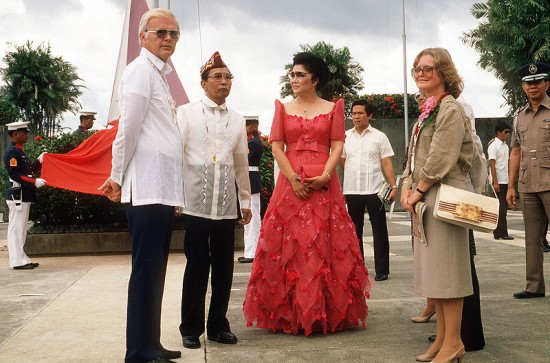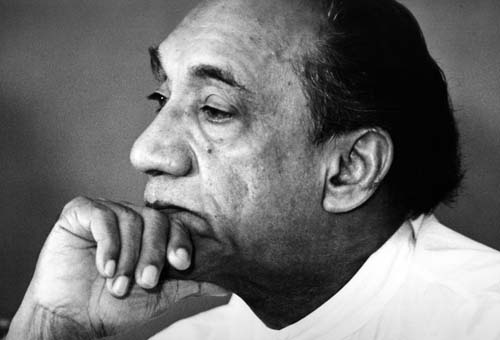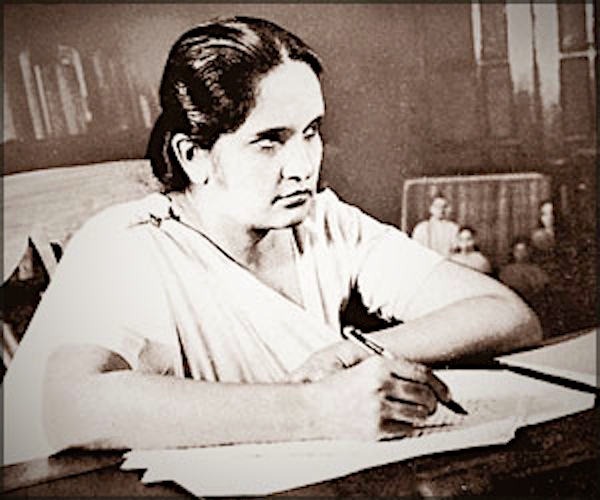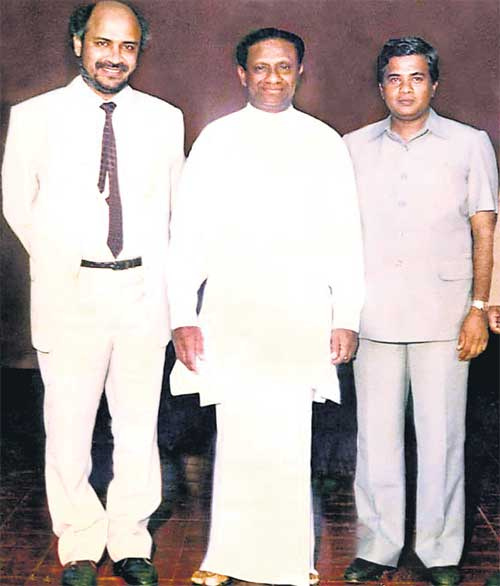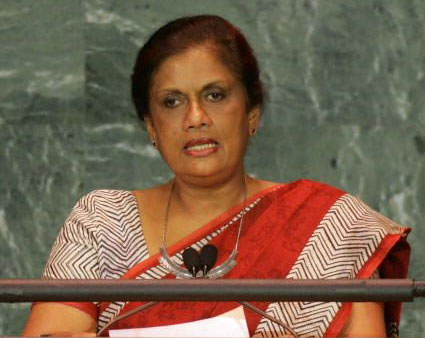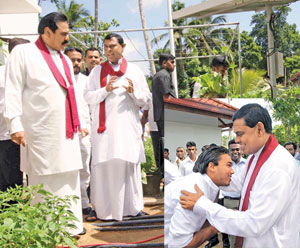Politics of power has destroyed the power of politics
“There will be no end to the troubles of states, or of humanity itself, till philosophers become kings in this world, or till those we now call kings and rulers really and truly become philosophers, and political power and philosophy thus come into the same hands.” – Plato
Power politics has its own momentum; it has its own dynamic, destructive and divisive stride and when it reaches its zenith, those who have played the power game become most vulnerable. For those who are at the very top are the ones that are the most visible targets, the most hated enemies and the most inflexible strategists. That is the reality of power politics.
A great number of leaders in history have shown us that, time and time again, power politics must always be played most ruthlessly,
most fiercely and most decisively. Examples from history are innumerable. From time immemorial, since the days of the Caesars and the Maurya, Gupta and Mogul emperors to the times of Napoleon, the Czars, Lenin, Hitler, and Mao Tse Tung, and to the modern-day Mubarak, Marcos, Kaddafi and Sadam Hussein, the fundamentals of power politics have not changed and none of those power players seemed to have learnt a lesson from history either, except perhaps Emperor Asoka in India in third century B.C.
Absolute power
The historian and moralist, who was otherwise known simply as Lord Acton, expressed this opinion in a letter to Bishop Mandell Creighton in 1887: “Power tends to corrupt, and absolute power corrupts absolutely. Great men are almost always bad men.” The core meaning of power politics is encompassed in this most often used quotation. Ironically it is used by politicians themselves more than any other thinkers. The reason for that may very well lie in a false sense of altruism politicians indulge in, willy nilly.
Power politics in Sri Lanka
How has this phenomenon called power politics played its course in Sri Lanka? Has it been reasonably fair to the majority of her people or has it been unsympathetic to them? Has it been reasonable to the players of the game and those who wield it? Has it produced the desired results for its practitioners? If it has not served well for the well-being of the majority, how has the majority responded? Have they been wise enough to respond in a timely fashion so that corrective measures could be introduced and adopted and implemented? The writer will make a genuine attempt to find credible answers to these questions or at least to some of them, if not all.
Politics and class
In this attempt, let us confine our investigation to the period immediately following Independence in 1948 up to the present day. With
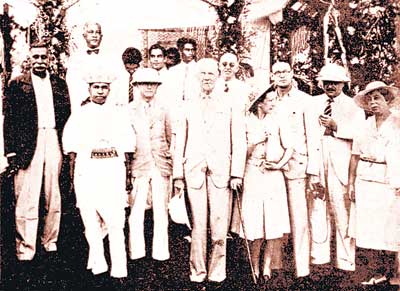
Soulbury Commissioners during a visit to Pelmadulla. Lord Soulbury and Sir Frederick Rees are in the middle with F. J. Burrows behind them. On the extreme left is D. S. Senanayake
the introduction of the Soulbury Constitution which was in fact drafted in 1946 by B P Peiris who was an Assistant Legal Draftsman at the time and refined by Sir Ivor Jennings, Sri Lanka embraced the Westminster System of governance fully. However, the caliber of legislators at the time was a way above what one might find today. Almost every one of the legislators sprang from a background of first-rate education, a so-called elite social status and a financially well-to-do class of society.
Transfer of power
This trend remained so up to a certain extent even after 1956 until it started evaporating in the seventies and eighties, especially in the non-UNP ranks. Transfer of power from one class to another: from the so-called elite to the non-elite, Sinhala-speaking, locally-educated majority of the people, made its mark gradually but with consistent regularity.
Well-educated Tamil politicians
Nevertheless, in the case of Tamil politicians in the North and East, whatever the social standard of those legislators might have been, the educational background of almost all candidates and those who were elected remained high and an object of envy of their Sinhalese brethren. As a result of this education-oriented inclination among those politicians in the Northern Province, their contributions in Parliament made some lasting impressions, which one would love to read with delight in the Hansard reports.
The UNP presence in parliament reduced
The government in power, however, practiced all executive power through the Cabinet of Ministers whose ‘first among equals’ was the Prime Minister. The legislative power and that of the Judiciary were exercised via Parliament and the Court system respectively
and a great majority of the class that occupied these high offices was of an impeccable and honest nature. The insulation-in-power process started setting in towards the early seventies when the SLFP-led coalition won a two-thirds majority in Parliament in 1970 and the main opposition party, the UNP, was reduced to a mere seventeen seats.
The Bandaranaike cabal
The April 1971 Insurrection, coupled with the introduction of the republican constitution in 1972 and the empowerment of a Super Minister in the person of Felix Dias Bandaranaike, created a false sense of security and ‘all-powerfulness’ among the hierarchy of the government. Prime Minister Mrs. Sirimavo Bandaranaike became increasingly dependent on Felix who was a close relative of her late husband; S W R D Bandaranaike. Her Private Secretary was Dr. Mackie Ratwatte, her own brother and the Minister who was in charge of her landmark legislation of land reforms was Hector Kobbekaduwa, another close relative of hers. The son of Sirimavo, Anura Bandaranaike, though not holding any official position in the government, exercised a tremendous amount of power and influence over the government decisions while the second daughter, Chandrika Bandaranaike headed the Land Reform Commission and presided over its activities with a sheer domineering presence. Although the executive powers of the government were carried out through the Cabinet of Ministers, real power resided in this close cabal of insiders where major decision-making took place.
Yankee-Dickey leader
The short-sighted policies of the socialist economic vision and the resultant scarcities and sky-rocketing unemployment, in addition
to the rising cost of living contributed to the disenchantment of the masses. Furthermore, J R Jayewardene’s ascendency to the helm of the UNP with the passing away of its much-beloved leader Dudley Senanayake did not make matters easy for the government. A grave miscalculation was made by the ruling United Front coalition ranks that JRJ was an unpopular, a ‘Yankee-Dickey’ type leader whom the general masses of the country would reject as against the socialists who were steering the power wheel of the government.
Felix’s empty boast
It was not to be. Even before Dudley’s death, evidence of the insulation process was in display. In 1972 there was a mini-general election – four bye-elections at Ratnapura, Kesbewa, Puttalam and Nuwara Eliya seats. Felix Dias undertook the campaign in Nuwara Eliya on behalf of the then Government and towards the end of the campaign, he sent a message to Colombo which read thus: “If you want see how a successful election campaign is run, come to Nuwara Eliya.” The results did not vindicate his boast. The UNP won three out of four seats that included Nuwara Eliya where Felix Dias and the UF candidate lost by more than a thousand votes. The effects of the insulation process were manifesting themselves.
The “polima” days
While the ever-lengthening lines for bread, milk and other essential food items were glaring in the face of the masses, the government carried on with their state-sponsored tamashas and self-promoting festivities. This happens to all those who wield power which they perceive as ever-lasting and limitless in scope and span. Those who are close to the power-circles invariably hesitate to tell their masters the truth. They tell them what they think the masters would like to hear. They conceal the true scenario by building an invisible wall around the masters. What is happening inside the wall is not known or seen by the outside and what is taking place outside the walls never reaches the inside core. The insulation-process is complete. Politics of power has begun its corrupting course on the power of politics.
Unelected self glorified hangers on
When the actual decision-making is done outside the legal and democratic setup, when power is being exercised by self-glorifying, un-elected cohorts, this degeneration process begins its destructive ride into the polity of the country. The power-wielders simply do not see this as it is occurring because they are not aware of its progress. Mayday celebrations were held with massive crowds transported using state-run buses and state-controlled print medium was pouring praise and tribute to the government politicos. True to the saying that ‘None are so blind as those who refuse to see’ the wielders of political power just refused to see the realities of the moment. They might have survived against a mediocre leader at the helm of the opposition, but not with J R Jayewardene whose political acumen was without equal and even at the age of late sixties, more energetic and vibrant than his band of lieutenants, most of whom were younger than him by two scores of years.
The Premadasa era
The next phase of this insulation-process emerged in the late eighties, with R Premadasa as the President of the country. Despite the fact that enormous and unprecedented powers were vested in one single individual-Executive President- in terms of the new
constitution of 1978, the insulation-process was not very much in evidence in that era, may be because JRJ selected his advisors from amongst his Cabinet colleagues. They included, among others, R Premadasa, Gamini Dissanayake, Lalith Athulathmudali, Ronnie de Mel, Nissanka Wijeratne and Cyril Mathew, all elected Parliamentarians and efficient Cabinet Ministers. J R Jayewardene’s circle of advisors was drawn from the very legitimate and legal body of the Cabinet.
Premadasa control
With the election of R Premadasa as President in 1988, the administrative landscape changed and it did change producing disastrous consequences, both for the UNP as well for the country at large. When the UNP won the Parliamentary elections in 1989 and even before the members of the newly formed Cabinet reached their respective homes after the swearing-in ceremonies, all Ministry Secretaries and Corporation and Board chairmen were appointed by President Premadasa himself.
Ugly politics but not quite nepotism
What JRJ had rightfully delegated to his ministers were withdrawn by the new President. A Presidential Secretariat that was formed became an ever-so-powerful power apparatus from which the entire country was governed. Key appointments were made to various ministries even without following the basic courtesy of informing the minister concerned. Not only political power but administrative powers as well were centralized in the Presidential Secretariat which was manned by hand-picked henchmen drawn from the legitimate bureaucracy and the private sector. However, one salient feature of this set of cohorts was that there were no relatives of the power-holder occupying any position in the inner circle. Yet, it was ugly.
Heavy cross to bear
The consequences were disastrous, first to the UNP with an unsuccessful Impeachment Motion being moved against President
Premadasa and then to the country, due to enormous power being concentrated in the hands of one single individual who knew how to use it and abuse it. Nevertheless, Premadasa was a shrewd politician and a brilliant speaker without equal. He could not be insulated from the outside world as he moved with the people. Yet, the sheer weight of power placed on his shoulders might have been too heavy a cross to bear.
Legacy of Chandrika
Unfortunate demise of Lalith and Gamini, deprived the writer and the country of an analysis of their power orientation had they lived to implement their power-orientations. But Chandrika Bandaranaike Kumaranatunga reign of power is another story altogether. She too wielded enormous power from the center and paid scant respect for those who were elected representatives of the people. This callous attitude of governance did not serve her legacy very well.
The Rajapakses
Mahinda Rajapaksa is a totally different player. Soon after assuming office as Executive President in 2005, Mahinda Rajapaksa embedded himself in the trenches of power with his siblings. Basil Rajapaksa appointed as Senior Advisor to President became more powerful than a senior Cabinet Minister. The other brother, Gotabhaya Rajapaksa, after being assigned the country’s defense apparatus, was considered the unofficial “Vice President”. The rest of the saga followed, almost without a murmur from the inner circles of the UPFA. Well into his second term, Mahinda has surrounded himself in the circle of power with more of his close relatives: Chamal Rajapaksa, the elder brother, is the Speaker; Chamal’s son is the Chief Minister of Uva. Chairman of Sri Lankan Airline is Mahinda’s brother-in-law; the holder of the topmost diplomatic billet-that of Ambassadorship in the US- is his cousin and the lineage is quite long. Power Insulation process is complete.
Credit for ending war
However, none can take the credit away from Mahinda Rajapaksa for successfully concluding the 27-year war with the LTTE. His political leadership was very much a factor; it was as significant, if not more, as the leadership provided by the service commanders
and our brave soldiers on the battlefield.
Insulated
The evidence of this insulation process was displayed in various forms and in various theatres of politics in the last couple of years. President’s pre-arranged speeches being cancelled by the hosts themselves in the UK owing to the pressures brought on them by the Tamil Diaspora, although he was advised not to attend these functions by the officialdom of the External Affairs Ministry, disregarding the whims and fancies of Mervin Silva and the inevitable shameful consequences of his bizarre behavior, ambivalent response to Bharatha Lakshman‘s murder and unjustifiable tolerance of the Duminda Silva episode, expansion of the cabinet portfolios and leaving some very senior politicians in cold storage etc. and other such episodes have contributed to the predictable conclusion that the insulation process is at work, but unfortunately to the great detriment of the country’s advance towards good governance and accountability.
The system is greatly responsible for this state of affairs. Had the office of President not being the chief executive in the country, these abuses and mistakes might not have been committed. It is true that when J R Jayewardene was the President, the misuse or abuse of
his office was not so glaring and obvious, for he treated the cabinet of ministers as a very powerful and legitimate part of the state executive machinery. Even when he wielded certain dictatorial powers, calling for letters of resignation from his entire cabinet at one time, the stoning of judges houses under his watch or more particularly in the case of disenfranchisement of Mrs. Sirimavo Bandaranaike, when Gamini Dissanayake as a loner in the cabinet voiced his honest opinion against such disenfranchisement, J R J did not treat Gamini as an enemy and the survival of Gamini as a legitimate successor to J R J was ample testimony to the extent to which tolerance of opposing opinion existed during that time. The writer is not holding any brief for J R J or some of his ill-conceived political coups. Yet, relatively speaking, what we went through during the JRJ era was much more tolerable than what is happening now. One could see that the men that hold power are very much a decisive factor as the system that produces such men.
Corroded
Power of politics has eaten into the fabric of politics of power and corroded the power apparatus. The country is no longer rich with individual talents of the caliber of Lalith Athulathmudali, Lakshman Kadirgamar and Gamini Dissanayake etc. Populist politics is fast overtaking prudence and creating far-reaching negative political adjustments. The currents of Presidential powers have benumbed the serious seekers of power. The education system is meshed with incompetence, inefficiency and apathy. In such a light where do our young look to? Thanks mainly to the free enterprise system, we might not see a recurrence of the economic morass that existed in the 1970-1977 era. We have not reached the impasse as yet, but slowly and surely, we are getting there.
